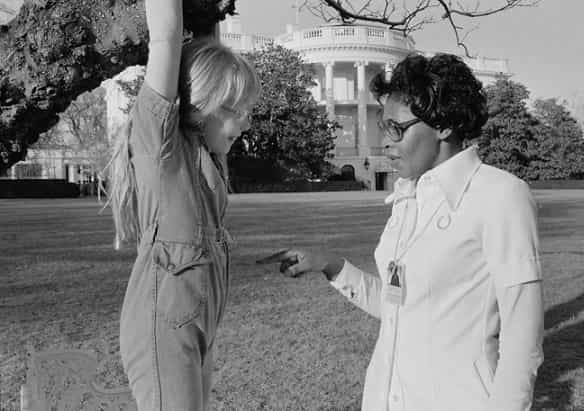A woman convicted of murder became the Carters’ beloved White House nanny

When Jimmy Carter became president in 1977, his wife, First Lady Rosalynn Carter, made a bold decision that shocked the nation. She hired Mary Prince, a Black woman convicted of murder, to work as a nanny for their daughter Amy in the White House.
This act of trust sparked controversy, but it also revealed the Carters’ deep commitment to justice, fairness, and second chances. Their bond with Mary Prince lasted a lifetime, challenging stereotypes and proving that compassion can transcend even the harshest judgments.
Who Was Mary Prince?
Mary Prince grew up in poverty in Georgia. She dropped out of school in seventh grade to care for her younger sister, facing hardships from a young age. In 1970, her life took a tragic turn when she was accused of murdering a man outside a bar in Lumpkin, Georgia. The incident began as an argument involving her cousin, but Prince was arrested and sentenced to life in prison.
Prince maintained her innocence, claiming she had no role in the crime. However, her trial was deeply flawed. She met her court-appointed lawyer for the first time on the day of her trial. He pressured her to plead guilty, falsely promising a light sentence. Instead, she received life in prison. Jimmy Carter later wrote that her race and poverty played a major role in the unfair trial. “If the victim had been white, we would never have known Mary Prince,” he said.
How the Carters Met Mary Prince
In 1970, Jimmy Carter was governor of Georgia. Mary Prince applied for a job through a program that allowed prisoners to work outside jail. Rosalynn Carter met her during this time and was immediately struck by her kindness. When Rosalynn needed a nanny for her 3-year-old daughter Amy, she asked Prince to take the job.
Amy quickly bonded with Prince. The toddler adored her, crying whenever Prince had to leave. Despite Prince’s criminal record, the Carters trusted her completely. “She was totally innocent,” Rosalynn insisted years later. “She had nothing to do with [the murder].”
From Prison to the White House
When Jimmy Carter won the presidency in 1976, the family faced a dilemma. Most advisors warned against bringing Prince to the White House, fearing public backlash. But Rosalynn Carter refused to abandon her. After the inauguration, she asked Prince, “How would like to work in this big old place?”
Prince accepted, and Rosalynn worked tirelessly to secure her release. She arranged for Prince to receive a reprieve (a temporary break from her sentence) and convinced President Carter to become her parole officer. Prince moved into the White House as Amy’s nanny, wearing a dress handmade by fellow inmates as a symbol of their support.
Public Backlash and Media Mockery
The decision to hire Prince drew criticism. Some White House staff doubted her innocence, while the public questioned the Carters’ judgment. The controversy even became fodder for comedy. In 1977, Saturday Night Live aired a skit mocking the situation. Actress Sissy Spacek played Amy Carter, while comedian Garrett Morris dressed as Prince, making insensitive jokes about her past.
The Carters ignored the noise. They stood by Prince, treating her as family. After Jimmy Carter’s presidency ended in 1981, Prince moved to Plains, Georgia, living just blocks from the Carters. She continued babysitting their grandchildren and remained a cherished friend.
A Friendship That Changed Lives
The Carters’ support didn’t stop at friendship. They advocated for Prince’s pardon, which she received after her case was reexamined. Jimmy Carter dedicated his 2004 book, Sharing Good Times, to “Mary Prince, whom we love and cherish.”
Mary Prince’s story became a symbol of the flaws in the criminal justice system. The Carters used their platform to highlight racial inequality and wrongful convictions. In his 2006 book, Our Endangered Values, Jimmy Carter called Prince’s case an example of how “the poor and people of color are often treated unfairly.”
Rosalynn Carter’s Legacy of Compassion
Rosalynn Carter, who passed away in November 2023 at age 96, was known for her mental health advocacy and humanitarian work. Her bond with Mary Prince reflected her belief in redemption and empathy. In Kate Anderson Brower’s book The Residence, Rosalynn said of Prince: “She’s still a huge part of the Carter family. They consider her one of their own.”
Prince’s life also transformed because of the Carters’ trust. She went from a prison inmate to a beloved member of a presidential family, proving that second chances can rewrite destinies.
Why This Story Matters Today
The Carters’ relationship with Mary Prince reminds us that justice isn’t always blind—especially for marginalized communities. Her wrongful conviction highlights systemic issues that still exist today: rushed trials, inadequate legal representation, and racial bias. The Carters’ willingness to stand by Prince, despite political risks, sets an example of moral leadership.
The story of Rosalynn Carter and Mary Prince is more than a historical footnote. It’s a lesson in empathy, the power of second chances, and the importance of questioning unfair systems. While the world debated Prince’s past, the Carters saw her humanity—and changed her life forever. Their friendship challenges us to look beyond labels and fight for what’s right, no matter the cost.
FAQ
1. Why was Mary Prince in prison?
Prince was convicted of murder in 1970 after a bar fight in Georgia. She always claimed innocence, stating she was not involved in the shooting.
2. How did the Carters help Mary Prince?
Rosalynn Carter hired Prince as a nanny, secured her temporary release from prison, and advocated for her pardon. President Carter served as her parole officer.
3. Was Mary Prince ever pardoned?
Yes. After her case was reexamined, Prince received a full pardon, clearing her name.
4. How did the public react to Prince working in the White House?
Many criticized the decision, and Saturday Night Live mocked the situation. However, the Carters ignored the backlash.
5. Did Mary Prince stay close to the Carters?
Yes. She lived near them in Georgia after the presidency and babysat their grandchildren. They remained friends until their deaths.
6. What does this story say about Rosalynn Carter?
It shows her compassion, courage, and commitment to justice, even when it was unpopular.
7. How did Amy Carter feel about Mary Prince?
Amy adored Prince as a child. Reports say she cried whenever Prince left her side.
8. What happened to Mary Prince after the pardon?
She lived a quiet life in Georgia, staying connected to the Carters and enjoying her freedom.
